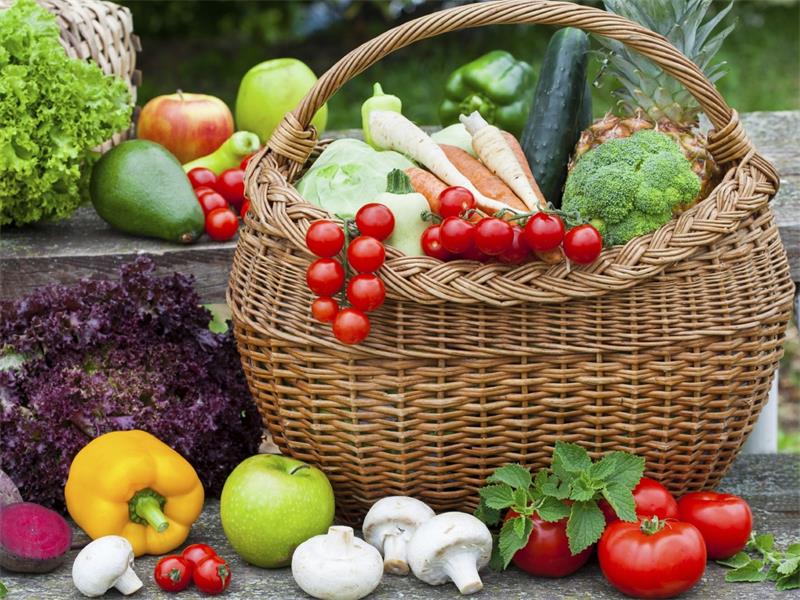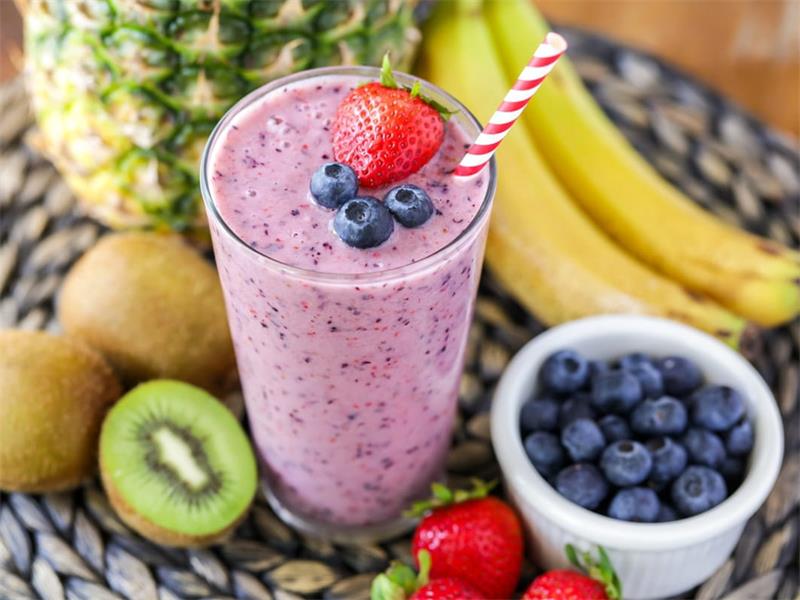Have you ever heard the saying, “You are what you eat?” Well, there’s a lot of truth to that! The foods we consume directly affect our bodies and minds.
Eating a balanced, nutrient-rich diet is essential for maintaining good health and overall well-being. But did you know that adding more fruits and vegetables to your daily meals can make a significant impact on your health?
When it comes to nutrition, fruits and vegetables are packed with vitamins, minerals, fiber, and antioxidants – all of which our bodies need to function properly. Unfortunately, many people don’t consume enough of these essential nutrients in their diets.
In fact, according to the Centers for Disease Control and Prevention (CDC), only 1 in 10 American adults eat enough fruits and vegetables every day! That’s a concerning statistic when you consider all the benefits these colorful plant-based foods have to offer.
So why exactly should we be eating more fruits and vegetables? Let’s take a closer look at some of their impressive health benefits. The Incredible Health Benefits of Fruits and Vegetables
Eating more fruits and vegetables can lead to a wide range of health benefits. For starters, they’re an excellent source of dietary fiber – the indigestible part of plants that helps regulate digestion by adding bulk to stool.
A diet rich in fiber has been linked to lower rates of heart disease, stroke, type 2 diabetes, and certain cancers (such as colon cancer), as well as better weight management by helping us feel fuller for longer. Fruits and veggies also contain an array of vitamins such as vitamin C (found in citrus fruits), vitamin A (in carrots), vitamin K (in spinach), and folate (in broccoli) among others which are essential for maintaining healthy skin, bones teeth eyesight among others- not forgetting strong immune systems too!
Antioxidants are also found in fruits and vegetables, which can protect your cells from damage caused by unstable molecules called free radicals. This can help reduce the risk of chronic diseases like cancer, heart disease, and Alzheimer’s.
Eating a diet rich in fruits and vegetables can improve your overall mood and cognitive function. A study published in the British Journal of Health Psychology found that people who ate more fruits and vegetables reported higher levels of happiness, life satisfaction, and well-being.
The nutrients found in these plant-based foods have also been linked to better brain health by improving memory retention and reducing the risk of mental decline. So if you’re looking to boost your health from head to toe – both physically and mentally – adding more fruits and vegetables to your diet is an excellent place to start!
Contents
Health Benefits
Reduce the risk of chronic diseases
Eating more fruits and vegetables can help reduce the risk of developing chronic diseases such as heart disease, diabetes, and cancer. These conditions are some of the leading causes of death in the world today, and their development can be influenced by our diet.
Fruits and vegetables contain vitamins, minerals, fiber, and antioxidants that promote overall health and well-being. According to research studies conducted over the years, people who consume a diet rich in fruits and vegetables have a lower risk of developing these chronic diseases than those who don’t.
Improved digestion and bowel function
Including more fruits and vegetables in your diet can improve your digestion by keeping your bowel movements regular. This is due to their high fiber content which helps to keep your intestines healthy. Eating enough fiber also helps prevent constipation which can cause discomfort or even lead to digestive problems like hemorrhoids or diverticulitis.
Boosted immune system
Fruits and vegetables contain essential nutrients like vitamin C, vitamin A, zinc, and iron among others that help to boost our immune systems. By eating more fruits and vegetables we provide our bodies with necessary vitamins that promote healthy cell growth as well as a stronger immune system. A boosted immune system means better protection against infections as well as faster healing from illnesses.
Increased energy levels
One of the benefits of eating more fruits and vegetables is increased energy levels throughout the day. Fruits such as bananas contain potassium which helps keep blood sugar levels stable while providing necessary electrolytes for both mental foci during stressful times or physical activity when needed most! Vegetables are rich in magnesium which supports muscle health helping you feel less tired after exercising or doing daily activities.
Incorporating more fruits & veggies into your meals will not only benefit you now but in the future too. By making small changes, such as swapping out a snack with a banana or adding some greens to your scrambled eggs, you can start feeling the benefits of eating healthier.
Nutritional Value
Fruits and vegetables are rich in vitamins, minerals, and antioxidants that your body needs to function at its best. For example, leafy greens like spinach and kale are high in vitamin K, which is essential for blood clotting and bone health.
Oranges and strawberries are excellent sources of vitamin C, which helps your body absorb iron and supports a healthy immune system. And colorful fruits like blueberries and raspberries contain powerful antioxidants that protect against cell damage.
But not all fruits and vegetables are created equal. Fresh produce contains more nutrients than processed foods.
When fruits and vegetables are canned or frozen, some of the nutrients can be lost during processing. Plus, canned fruits often have added sugars that can negate some of the health benefits.
Comparison between fresh produce and processed foods
Fresh fruits and vegetables should be the primary source of nutrients in your diet. When you eat whole foods like apples or carrots, you’re getting all the vitamins, minerals, fiber, and antioxidants without any added sugars or preservatives.
On the other hand, processed foods like fruit snacks or juice boxes often have added sugars or artificial flavors to make them taste better. While they may still contain some vitamins or minerals, they don’t provide enough nutritional value to make them a healthy choice.
So if you want to get the most nutritional value from your food choices, focus on eating more fresh fruits and veggies. Try incorporating a variety of colors into your meals – red peppers for vitamin C, and dark leafy greens for calcium – to ensure you’re getting a wide range of nutrients every day.
The Bottom Line
Fruits and vegetables have an incredible nutritional profile that provides numerous health benefits when consumed regularly as part of a balanced diet. Fresh produce is generally superior to processed alternatives because it’s packed with more vitamins, minerals & antioxidants without any added sugars or preservatives.
By choosing to eat more fruits and vegetables, you’re giving your body the essential nutrients it needs to function at its best. So next time you’re at the grocery store, grab some fresh produce and start reaping the health benefits!
Weight Management
Low-Calorie Content in Fruits and Vegetables
One of the key benefits of eating more fruits and vegetables is their low-calorie content. This makes them an ideal food for those looking to lose weight or maintain a healthy weight. Fruits and vegetables are mostly made up of water, fiber, and nutrients, which means they are naturally low in calories.
For example, one cup of sliced strawberries contains only 50 calories, while a medium-sized apple has around 95 calories. In contrast, processed foods like chips and candy bars are often high in calories but low in nutrients.
This means that even small portions can quickly lead to overconsumption of calories. By choosing to eat more fruits and vegetables instead, you can enjoy larger portions without consuming too many calories.
High Fiber Content that Keeps You Feeling Full Longer
Another reason why fruits and vegetables are great for weight management is their high fiber content. Fiber is a type of carbohydrate that cannot be digested by the body.
As a result, it passes through the digestive system largely intact, helping to keep you feeling full for longer periods of time. Fiber also slows down the absorption of glucose (sugar) into the bloodstream after eating, which helps regulate blood sugar levels.
This reduces cravings for sugary snacks and other unhealthy foods that can lead to weight gain. Some examples of high-fiber fruits include berries, apples, pears, oranges, and bananas while some examples of high-fiber vegetables include broccoli, cabbage, carrots, and cauliflower among others.
Creative Ways to Incorporate More Fruits And Vegetables into Your Diet
If you’re struggling to incorporate more fruits and vegetables into your diet or just want some new ideas on how to prepare them creatively while still maintaining their nutritive value, there are many ways you can do so. One great way is to add them to smoothies. You can blend together a variety of fruits and vegetables with some yogurt or milk for a delicious and healthy breakfast or snack.
Another creative way to incorporate more fruits and vegetables into your diet is by making salads with unique ingredients like pomegranate seeds or roasted beets, which can add bursts of flavor and color. Additionally, you can also try making vegetable-based soups or stews, where the flavors of different vegetables blend together beautifully.
You can replace unhealthy snacks like chips and candy bars with sliced apples with almond butter or carrot sticks with hummus as healthy snack options during the day. With all these options available, it’s easy to eat more fruits and vegetables in a fun and creative way while still maintaining weight management goals!
Mental Health Benefits
Improved Mood and Reduced Stress Levels
Eating more fruits and vegetables can have a positive impact on your mental health. Studies have shown that people who consume a diet rich in these foods experience fewer symptoms of anxiety and depression. The nutrients found in fruits and vegetables, such as vitamin C, have been linked to lower levels of cortisol, the hormone responsible for stress.
Additionally, the fiber in these foods helps to regulate blood sugar levels, which can prevent mood swings. One way to increase your fruit and vegetable intake is by incorporating smoothies into your daily routine.
A refreshing smoothie made with spinach, kale, berries, and banana can provide a significant amount of vitamins and minerals while also boosting your mood. Another option is to add sliced fruit or veggies to your water for a tasty infused beverage that will keep you hydrated throughout the day.
Better Cognitive Function
In addition to improving mood and reducing stress levels, eating more fruits and vegetables has been linked to better cognitive function. The antioxidants in these foods protect brain cells from damage caused by free radicals, while the vitamins promote healthy brain function. Leafy greens like spinach and kale are particularly beneficial for brain health due to their high concentration of vitamin K.
To get more leafy greens into your diet, consider adding them to salads or sautéing them as a side dish with dinner. You could also try making a vegetable soup with carrots, onions, celery, tomatoes, and other veggies for an easy way to incorporate multiple servings at once.
The Importance of Variety
It’s important to note that different types of fruits and vegetables offer different benefits for mental health. For example, citrus fruits like oranges are high in vitamin C which has been shown to improve mood while blueberries are packed with antioxidants that protect against cognitive decline. To get the most benefits, try to eat a variety of different fruits and vegetables each day.
Incorporate different colors and textures to keep your meals interesting and flavorful. By doing so, you’ll not only improve your mental health but also boost your overall health and well-being.
Creative Ways to Incorporate Fruits and Vegetables into Your Diet
Smoothie Recipes with Various Fruit Combinations
Looking for a quick and easy way to incorporate more fruits and vegetables into your diet? Smoothies are the perfect solution! With endless combinations of fruits and vegetables, you can create a delicious and nutritious drink that will keep you energized throughout the day.
One of my favorite smoothie recipes is a tropical blend of mango, pineapple, and spinach. The sweetness of the fruits masks the taste of the spinach, making it a great way to sneak in some extra greens.
Another great option is a berry blast smoothie with strawberries, blueberries, bananas, and kale. Not only is this smoothie packed with vitamins and minerals, but it’s also deliciously refreshing on a hot summer day.
Salad Ideas with Unique Ingredients like Pomegranate Seeds or Roasted Beets
If you’re looking for a more substantial way to incorporate fruits and vegetables into your diet, salads are an excellent choice. Not only are they filled with vitamins and minerals, but they’re also incredibly versatile. One salad idea that I love is mixed greens topped with sliced apples, crumbled goat cheese, walnuts, dried cranberries, and drizzled honey mustard dressing.
The sweet flavors of the fruit complement the tanginess of the goat cheese perfectly! If you’re looking for something more savory, try roasted beets over mixed greens with feta cheese crumbles topped with balsamic vinaigrette.
Snack Options Like Sliced Apples with Almond Butter or Carrot Sticks with Hummus
Snacking on fruits and vegetables throughout the day can help boost energy levels while keeping hunger at bay until mealtime. One simple snack idea is sliced apples drizzled with almond butter.
The combination of crunchy apples and creamy almond butter is a match made in heaven! Another great snack option is carrot sticks with hummus.
Not only are carrots packed with vitamins, but the hummus is loaded with protein and healthy fats, making it a satisfying snack that will keep you full until your next meal. Try different types of hummus, like roasted red pepper or garlic to mix up the flavors.
Incorporating more fruits and vegetables into your diet doesn’t have to be boring! With these creative ideas, you’ll be on your way to a healthier, happier lifestyle in no time.
Conclusion
As we’ve discussed throughout this article, there are numerous benefits to incorporating more fruits and vegetables into your diet. From reducing your risk of chronic diseases to improving your mental health, the advantages are clear. One of the best things about making these changes is that small adjustments can make a big difference.
Start by adding a serving of fruit or vegetables to each meal, or swapping out a processed snack for a piece of fresh produce. As you get used to these changes, you can increase the amount and variety of fruits and vegetables in your diet.
Try new recipes and experiment with different types of produce until you find what works best for you. The good news is that eating more fruits and vegetables doesn’t have to be boring or bland.
With some creativity in the kitchen, you can make delicious meals and snacks that are good for you too. So start today by taking one small step towards a healthier future!












